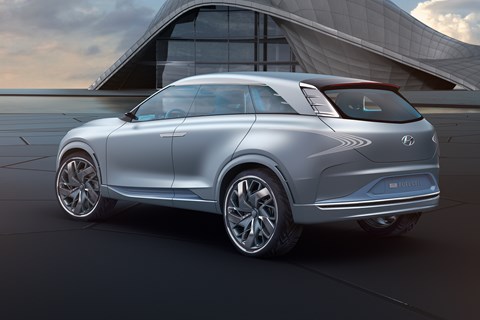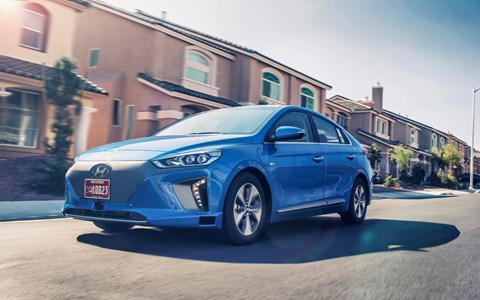► Concept previews future fuel cell vehicle
► Follows ix35 Fuel Cell production car
► 14 new Hyundai eco-focused cars until 2020
Hyundai is showcasing its own particular vision for the future of eco-friendly motoring at the Geneva motor show with the FE concept car.
Short for Future Eco, the FE is a hydrogen fuel-cell vehicle and one of 14 low-emission Hyundai cars planned to launch before 2020, solidify the brand’s plans to assert itself as a pioneering environmentally friendly car maker.

Hyundai FE concept: what’s the story?
Powered by a new, improved hydrogen fuel cell system a stage further in development than the existing ix35 Fuel Cell, Hyundai claims its powerplant is 20% lighter and 10% more efficient.
It’s designed to run for more than 490 miles before you need to refuel with hydrogen and, despite its unique look, it’s set to influence another SUV fuel cell vehicle which will launch in 2018. Could there be a Tucson fuel cell in the pipeline?
Fourteen eco cars in the next three years
The FE Fuel Concept is just one of 14 cars planned to become available in the Hyundai range with some form of so-called eco-propulsion in the near future. That’s a combination of hybrids, plug-in hybrids and electric vehicles, as well as the car the FE concept previews – a fuel cell SUV in 2018.
It signifies Hyundai’s intention to become a leader in alternative fuels and eco cars in a remarkably short period of time. Hydrogen-filling infrastructure is far from widely established in the UK currently, let’s not forget.

Self-driving cars remain on the cards…
…as shown by the autonomous Ioniq concept car (above) also on show in Geneva.
It’s already seen service scurrying around the streets of Las Vegas at the CES 2017 show, but now the company is showing its intention to provide autonomous tech on its cars in a cheaper and more user-friendly way.
Undergoing extensive testing, the autonomous Ioniq features all the clever tech behind the closed-off front grille, using a variety of advanced systems to keep the car in its lane and connected with other cars around it.
The aim of this research, Hyundai says, is to refine self-driving tech in cars that’ll become more widely available in the future.